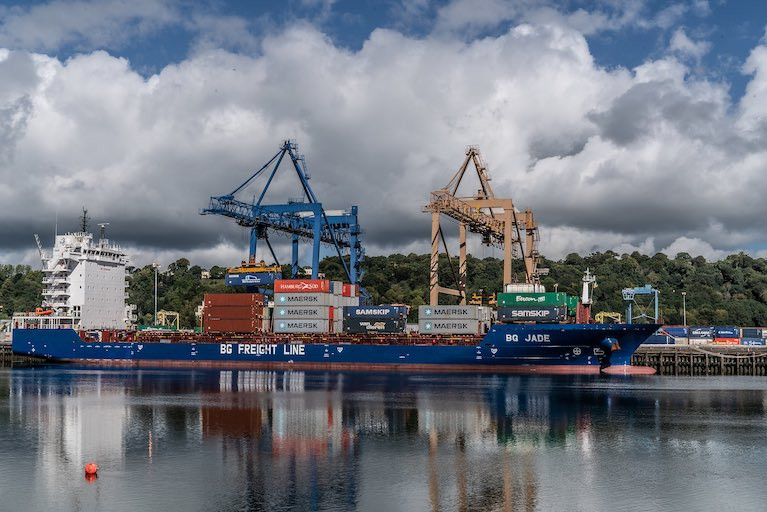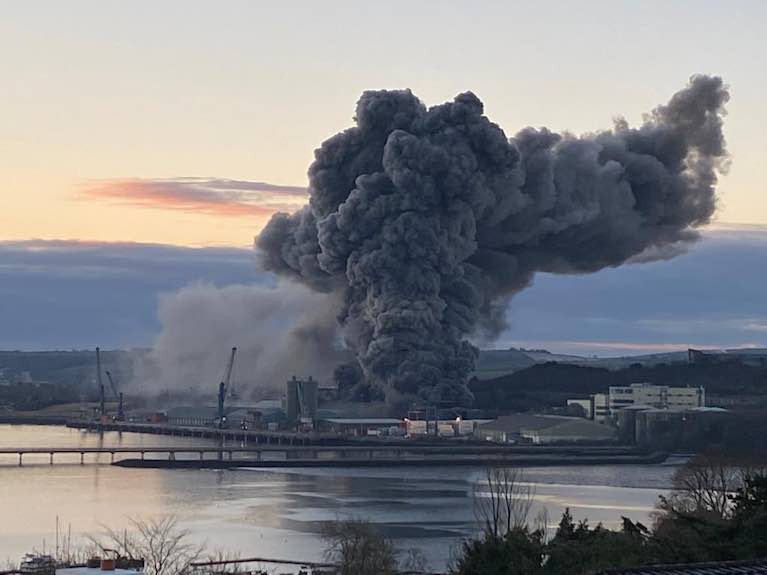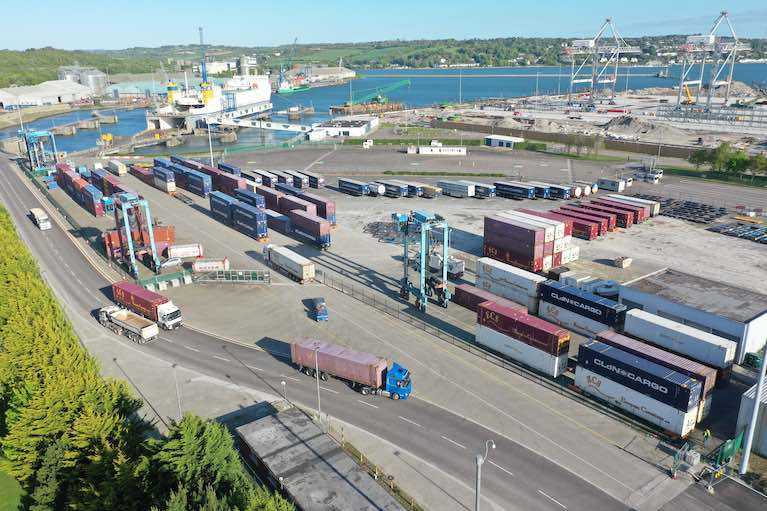Displaying items by tag: port of Cork
Cork Harbour – An International Energy Hub
On Thursday 13th May 2021, Cobh and Harbour Chamber will welcome members and guests to their fourth virtual breakfast series, in association with the Port of Cork. The theme of this week’s breakfast is ‘Cork Harbour – An International Energy Hub’ and boasts five speakers from local companies, such as Conor Mowlds Port of Cork, Pat O’Brennan Doyle Shipping Group, Mike King Irving Oil, Mick Horgan Green Rebel Marine and Brian Fitzgerald Simply Blue Energy Ltd.
Earlier in the year, Cork Harbour was pinpointed as a potential energy hub as it is perfectly positioned to support both transition and renewable energy activities and to the growing offshore wind sector. Cobh & Harbour Chamber are aiming to further explore this potential and discover the opportunities for the Harbour in greater detail at this week’s breakfast.
Cobh & Harbour Chamber President, Johanna Murphy said: ‘This sector has the potential to be really big for Cork Harbour and as a Chamber we want to support those companies involved and highlight to our members the benefits this sector could bring to the area.’
 Brian Fitzgerald of Simply Blue Energy Ltd
Brian Fitzgerald of Simply Blue Energy Ltd
‘To date our breakfast series, in association with the Port of Cork have been very successful, however, this one is proving to draw the largest numbers of attendees, which shows the local interest in this sector and the appetite to be part of this exciting time for Cork Harbour.’
The Port of Cork, who are main sponsors for the 2021 Breakfast Series are also speaking at this event.
Conor Mowlds, Chief Commercial Officer Port of Cork said: ‘We are proud to sponsor these events which have been very popular among Cobh & Harbour Chamber members and non-members. We have a longstanding relationship with the Chamber and together we have seen business sectors grow and flourish. We hope now we will see the same happen for the energy sector, as we position Cork Harbour as an International Energy Hub.’
For anyone interested in this event, it will take place virtually on Thursday 13th May 2021 at 9.30 am, and attendees can register here https://www.cobhharbourchamber.ie/events/
Port of Cork & Cork Water Safety Issue Joint Safety Message to All Marine Leisure Users in Cork Harbour
Ahead of the May Bank Holiday weekend, the Port of Cork and Cork Water Safety are issuing a safety message to all marine leisure users in Cork Harbour, as well as swimmers and jet ski users.
As the weather warms up and sports like rowing and sailing recommence the Port of Cork and Cork Water Safety want to remind users to be always safety conscious. A particular emphasis is on personal watercraft safety, in this case jet skis. Users are reminded to adhere to the 6 knots speed limit when within 60 m of a pier, jetty, slipway, mooring, shore or another vessel and 120 m of a swimmer or dive flag.
Freestyling is not permitted within 200m of swimmers, or the shoreline and users should always maintain a proper lookout for boats and keep clear of all other craft. Wearing a life jacket is essential and the engine kill switch must be used.
According to the Port of Cork Harbour Master, Captain Paul O’Regan, now is the time to consider all safety options before heading out on the water and to respect other users, wildlife & the environment.
He said: ‘It’s absolutely wonderful to see leisure users on the water around Cork Harbour, enjoying this fantastic amenity, but we want to ensure all activities are carried out safely. We see more and more people going to the piers and slipways in Cork Harbour to swim; we strongly advise people not to do this as tidal flows and currents at these areas can be very strong. Marine craft often use these piers and slipways and may not always see swimmers in the water, please instead swim at designated swimming areas.’
He continued: ‘We are also advising personal watercraft safety especially in the case of jet skis and new awareness signage has been erected at different locations around Cork Harbour to remind people of the safety procedures they should take.’
Cork Water Safety added: ‘With one of the busiest summers at our doorstep, it is vitally important to be mindful of water safety in the coming months. It is fantastic to see so many open water swimmers jumping and getting active during the pandemic. Let's try to keep ourselves safe as more of us flock to the water this summer!’
‘Tell someone you’re going for a swim and when you’ll be back. Wear a toefloat. Keep warm with an insulated rash vest and two hats. If possible, never swim alone. Only swim at designated swimming areas, especially in a busy harbour like the Port of Cork! Whether you are an experienced swimmer or new to the sport the advice stays the same. If you are new to the area, research and ask locally about the possible dangers e.g., currents, marine traffic, and leisure craft. Remember – Better Safe, Than Sorry.’
The Irish Coastguard recently launched their ‘BE ALERT TO WATER SAFETY’ campaign and reminded people if you see anybody in difficulty on the shore or in the water, dial 112/999 and ask for the Coast Guard.
The Port of Cork has announced that the Grimaldi Group will offer a twice-weekly direct Ro-Ro service from Cork to Antwerp beginning the second week of May.
This new service builds on Grimaldi Group’s reputation and their continued investment.
Conor Mowlds, Chief Commercial Officer, Port of Cork said: ‘The decision by the Grimaldi Group to offer a direct Cork-Antwerp-Cork freight service is very welcome and will greatly support our efforts to keep supply chains moving during the current Covid-19 pandemic. The new service will also further strengthen Cork’s direct links with the heart of Europe, capitalising on the market’s growing use of the unaccompanied freight model, as shippers seek direct links to market rather than use the UK Land bridge.’
The Grimaldi Group have been calling to Cork on a regular basis for almost 25 years for the transport of rolling freight and containers. The Naples based Group operate a fleet of over 130 Ro-Ro, Con-Ro, Ro-Pax and cruise ferry vessels supported by investments in people, ports, terminals, and intermodal equipment worldwide and this new Irish service will link into the network at Antwerp.
Port of Cork Harbourmaster Capt Paul O'Regan on New Routes, Vessels & Non Tidal Container Terminal for Cork Harbour (PODCAST)
Brexit, Covid-19 and the situation of seafarers who have been unable to take their leave since the pandemic hit – these are just some of the challenges facing harbourmasters in ports around the island.
Cork harbour, which is being transformed with a new all-tide container terminal at Ringaskiddy and a linking motorway, is handling more direct Ireland-France ferry links with three new weekly freight-only sailings by Brittany Ferries.
Covid-19 has hit tourist traffic, but Cork is handling new freight routes including a weekly service to Zeebrugge.
 Two new Liebherr post-Panamax size ship-to-shore (STS) container gantry cranes make an impressive sight cutting the Cork Harbour skyline at the Cork Container Terminal (CCT) in the Republic of Ireland. Port of Cork took delivery of the gantry cranes at the terminal in February last year. The cranes improve liners’ schedule reliability and reduce trade costs and inventory holding outlays for shippers
Two new Liebherr post-Panamax size ship-to-shore (STS) container gantry cranes make an impressive sight cutting the Cork Harbour skyline at the Cork Container Terminal (CCT) in the Republic of Ireland. Port of Cork took delivery of the gantry cranes at the terminal in February last year. The cranes improve liners’ schedule reliability and reduce trade costs and inventory holding outlays for shippers
Last year, Independent Container Line (ICL) introduced a new weekly direct service from Cork to North America - providing Ireland with its first direct container service to the US in many years.
 The new direct cargo service to the US east coast from Port Of Cork Independent Vision first arrived at the Port last June Photo: Port of Cork/Twitter
The new direct cargo service to the US east coast from Port Of Cork Independent Vision first arrived at the Port last June Photo: Port of Cork/Twitter
A recent report - entitled Cork Harbour 2025: Ready to Float - calls for Cork to be earmarked as a renewable energy service hub for the Celtic Sea.
"Plans for the extension of the deepwater berth in Ringaskiddy could add significant capacity to the capabilities on offer in Cork harbour in support of the nascent floating wind boom in the Celtic Sea,” the report by Cork and Cobh chambers of commerce and a number of companies in the renewable energy sector states.
 Progress continues on the development of the new Port of Cork terminal with the two new Liebherr post-Panamax size ship-to-shore (STS) container gantry cranes (left) and Pont Aven ferry in berth (right) Photo: Bob Bateman
Progress continues on the development of the new Port of Cork terminal with the two new Liebherr post-Panamax size ship-to-shore (STS) container gantry cranes (left) and Pont Aven ferry in berth (right) Photo: Bob Bateman
Port of Cork harbourmaster Capt Paul O’Regan spoke to Wavelengths in the first of an occasional series on ports, and you can hear him below
Kinsale Gin Departs Port of Cork for China
The team from Kinsale Spirit Company were in the Port of Cork Container Terminal today to watch as a shipment of Kinsale Gin and Red Earl Irish Whiskey was loaded for export to China. With sales already gaining pace in the USA, this is the first full container being exported to China for this successful Cork SME.
In 2020, Kinsale Gin, a premium gin distilled in Cork, won three international awards – Gin of the Year, Gin Producer of the Year, and a Double Gold, while Red Earl Irish Whiskey scooped numerous awards also.
Having efficient and reliable global trade connections is vitally important when aiming to get any product to market. The Port of Cork has that global connectivity which ensures importers and exporters have options when it comes to shipping containers around the world.
Conor Mowlds, Chief Commercial Officer at the Port of Cork said: ‘Kinsale Spirit Company is a great local success story for Cork, and we were honoured to see their first container of gin and whiskey exported from Cork to China. No matter how big or small a company, using the right Port with most efficient connections is so important when it comes to getting your product from local to global.’
Colin Ross from Kinsale Spirit Company said: ‘As three proud local businesspeople, Tom, Ernest and I are delighted that such effective infrastructure exists on our doorstep. Port of Cork have been excellent to deal with and we look forward to shipping many more containers worldwide from there in the future.’
Port of Cork Pilots Navigate Big Seas in Interceptor 48 Pilot Boat (VIDEO)
Safehaven Marine captured footage (below) of the Port of Cork Pilots in their Safehaven Built Interceptor 48 Pilot Boat ”Failte” undertaking pilot transfers off Cork Harbour during the recent days of strong south-easterly gales.
Roches Point lighthouse recorded 50 knots of wind on the 13th as the Cosco bulk carrier passes by. The Cork Wave Buoy ( two NM off the harbour entrance) recorded waves of up to 6.7m at the time.
Despite the challenging sea state, the pilot boat coxswain managed to get alongside and safely disembark the pilot.
 The Port Pilot boat off the stern of the Cosco bulk carrier as it departs Cork Harbour Screenshot: Safehaven Marine
The Port Pilot boat off the stern of the Cosco bulk carrier as it departs Cork Harbour Screenshot: Safehaven Marine
Most ports in the world require pilotage, it is the practice where a pilot comes on board near the entrance of the port and then assists the ship's captain with bringing the ship into port and docking or anchoring in the designated anchorage. The pilot also helps provide safe passage when the ship departs.
Afterwards, on the 15th the conditions in Cork Harbour moderated with the Grimaldi car carrier able to depart which Safehaven Marine caught via drone footage.
 The Port of Cork Interceptor 48 Pilot boat alongside the Grimaldi car-carrier Screenshot: Safehaven Marine
The Port of Cork Interceptor 48 Pilot boat alongside the Grimaldi car-carrier Screenshot: Safehaven Marine
The footage documents the essential work of the port, its' pilots and pilot boat crew in keeping the port working and shipping moving in such bad sea and weather conditions.
Port of Cork Pilots in Bad Weather at Cork Harbour Entrance
Port of Cork Trade Traffic Drops in 2020
The Port of Cork has reported that total traffic through the Port was down 2% to 9.2 million tonnes in 2020. The dip in trade traffic is a direct result of the challenges posed by Covid 19 and the cancellation of cruise calls to Cork in particular.
Despite these challenges, overall container traffic through the Port of Cork reached 250,000 TEUs, an increase of 4%. The Port attributes the strong performance in this area to several drivers, chief amongst them a demand from customers for direct routes, resulting in the introduction of several new container services.
In April 2020, CLdN Ro-Ro SA commenced a new weekly freight service between Cork and Zeebrugge. This route subsequently increased to twice weekly, highlighting the positive demand for direct, unaccompanied freight links to the EU, as shippers look to avoid the uncertainty surrounding the UK land bridge as a consequence of Brexit.
A further new route was established in June 2020, when Independent Container Line (ICL) commenced a new weekly direct service from Cork to USA, giving Ireland its first direct container service to the USA in many years.
Unfortunately, Covid 19 impacted heavily on the Port’s tourism-related activities, with Brittany Ferries services to the continent decreasing sharply and only two cruise ship calls completed, compared to over a hundred calls in the previous year. The outlook for a return to cruise activities, in particular, remains poor and will remain so until the worst of the pandemic has past and confidence in that sector can start to rebuild.
Other areas of Port traffic, such as liquid bulk and breakbulk decreased marginally, however, these areas are set to return in 2021.
Conor Mowlds, Chief Commercial Officer, Port of Cork said: “While 2020 was a challenging year, our port operations remained open throughout and we continued to play an important role in ensuring supply chains were maintained across the southern half of the country”.
He continued: “Some areas of our trade were adversely affected, particularly our cruise business, which effectively ceased last March due to COVID. That said, with the significant efforts that are being placed in the development of effective return protocols, we are confident that we will see a return to some level of cruise activity by the end of this year, and certainly in 2022. Even with the challenges of the global pandemic and the advent of Brexit, the Port of Cork has welcomed several new freight services to the continent and an exciting, innovative direct link to the US, showing our resilience and capability to adapt, and our commitment to fulfilling our role as a vital cog in keeping the region moving”.
Bantry Bay Port Company, sister Port to the Port of Cork, had a strong performance and reported an increase in total trade traffic in 2020 to 1.3 million Tonnes.
Port of Cork Statement: Fire Under Control, Cork Harbour Ship Operations Suspended as a Precaution
The fire at the Port of Cork has been brought under control and there are no reports of any casualties.
The Port has confirmed in a statement that a fire which broke out at a grain storage facility on the Ringaskiddy Deepwater Berth this morning is now under control.
Emergency services remain on site to monitor the area.
As a precaution, all ship operations in Ringaskiddy have been suspended until further notice.
Ambulance and Fire Brigade are now on scene tackling the blaze in Ringaskiddy. According to @RingaskiddyRA, Hall's Grain Stores is what is on fire. Residents have been advised to keep windows and doors closed. pic.twitter.com/tL4ug9kmX5
— Cork Safety Alerts (@CorkSafetyAlert) January 9, 2021
Firefighters at Port of Cork Deal With Major Blaze
Firefighters are dealing with a huge blaze at the Port of Cork which has reportedly broken out in a grains store at its deepwater port in Cork Harbour.
Cork County Fire Service, as well as fire crews from the Port itself, are on the scene.
It is understood the fire broke out earlier in a large silo used for the storage of animal feed.
A huge plume of smoke is visible in the area and local residents have been advised to close their windows until the blaze has been brought under control.
There are no reports of any injuries at this stage.
Firefighters tackling the blaze which has broken out at the R & H Hall animal grain storage facility @PortofCork deep water facility #Ringaskiddy - Port Emergency plan has been activated @rtenews pic.twitter.com/9pfPvzSsAs
— JennïeØSullivân (@OSullivanJennie) January 9, 2021
Following a strong start to CLdN’s weekly Con-Ro service from Cork to Zeebrugge, the shipping line announced a second call to accommodate demand. This second direct service from Cork to the EU commenced today, offering more flexibility to Irish customers, ensuring supply chains are maintained.
Considering Brexit and combined with the modal shift from accompanied to unaccompanied shipping, having a second direct link between Cork and Zeebrugge will bypass the UK Landbridge. For importers and exporters, this means avoiding unnecessary border checks thus ensuring cargo flows more effectively and in a cost-efficient manner from Ireland direct to the continent.
According to CLdN, over the last months, there has been steady growth in customer demand for reliable, low cost and Brexit-proof unaccompanied freight products. Shipping unaccompanied trailers, (tank) containers, finished vehicles or project cargo between its own ferry terminals provides a ‘one-stop shop’ for customers to get goods shipped across the North Sea without running the risk of disruption.
A spokesperson for the Port of Cork said: ‘Recently we have seen the spotlight on Ro-Ro freight since Brexit came into force, however, CLdN have seen a shift to unaccompanied freight, which is clearly popular among logistic companies and advantageous. The benefits of unaccompanied freight can bring a reduction in costs, greener freight movements as minimising the amount of time your drivers are on the road and greater flexibility depending on the type of cargo being shipped.’
A spokesperson from CLdN stated: ‘As we have shown and continue to deliver, we will deploy larger vessels or add more frequency to match demand to and from Ireland and will react immediately the market signals a requirement, as we see the Irish market as a core route in our portfolio'.


































































